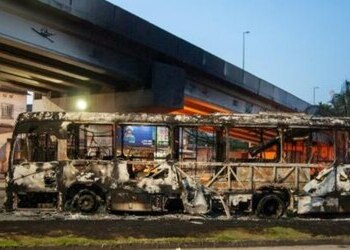Brazil’s government launched a crackdown on militias, but in Rio de Janeiro, the state police may be standing in the way.
On November 6, army and police troops were deployed at ports and airports in Rio de Janeiro and São Paulo, as well as other states. This was done in order to “amplify intelligence actions … arrests and seizures of assets belonging to gangs and militias,” President Luiz Inácio Lula da Silva said when announcing the plan to fight the criminal groups on November 1.
Among those targeted were top militia leaders in Rio de Janeiro. On October 31, federal police arrested Dalmir Barbosa, and his son, Taillon, alleged leaders of the Rio das Pedras militia, one of the oldest in the city. Two police officers and an ex-army sergeant working as bodyguards for the pair were also arrested.
Dalmir was a military police officer until he was thrown out in 2011. Many militias were founded in the 1980s by former police as vigilante groups to fight back against drug traffickers.
SEE ALSO: Brazil Tries to Reclaim Rio’s Favelas – Ad Infinitum
On October 23, Matheus da Silva Rezende, alias “Faustão,” was shot dead by Rio’s state police in western Rio. Faustão was the second-in-command of Justice League (Liga da Justiça), Brazil’s most powerful militia, and the nephew of its leader, Luís Antônio da Silva Braga, alias “Zinho.”
Zinho’s response was swift. In a well-coordinated attack, militias set fire to dozens of buses, trucks, and a train across western Rio. The outburst of violence closed schools and paralyzed traffic.
This violence took place in parts of the city where militias have long acted with near-complete impunity. Over the last decade, militias have progressively taken over governance in much of western Rio. As InSight Crime reported in 2022, locals in neighborhoods under militia control depend largely on these groups for access to electricity, gas, water, Internet, television, parking spots, medicine, and real estate. Entire apartment blocks have been built, off the books and on protected land, to be run and sold by the militias.
InSight Crime Analysis
While federal police have had success in arresting and prosecuting top militia members, the close history between Rio’s state police and militia groups could undermine a wider crackdown.
Police officers in Rio are regularly arrested for links to militia groups and are closely connected to these criminal organizations, according to crime analysts.
“The efficiency of state police is hampered by the participation of hundreds of their agents in organized crime,” said Carolina Grillo, a sociology professor at the Federal Fluminense University in Rio who closely studies militia groups, told InSight Crime.
SEE ALSO: Rio Militias and Their Complex Empire of Legal Businesses
The case of the Justice League is a good example. Until 2008, the Justice League’s leaders were all active or retired police officers. This changed when Faustão’s family killed a number of police officers and took over the leadership. Two of his uncles, both among Rio’s most powerful militia leaders, were shot and killed by state police in 2017 and 2021.
There is now speculation in the Brazilian press that Faustão was targeted after he assassinated a former state police officer who founded the Justice League.
“Rio’s police are also subject to less oversight than the federal police,” Benjamin Lessing, a University of Chicago expert on criminal conflict and corruption in Brazil, told InSight Crime.
“The state Attorney General’s Office has not been doing a great job at overseeing the state police,” he said.
One reason for this, he suggested, was that Rio no longer has a public security secretary.
Federal police, meanwhile, have been lauded for their efforts. Federal police agents were behind the recent arrest of Dalmir Barbosa. They reinforced their presence in Rio after the bus burnings and have led complex investigations into the inner workings of the militias for more than a decade.
“The federal police are doing a great job … but it’s limited in its reach. It is good at arresting high-level criminals, at being able to put together the kind of evidence to prosecute these sorts of crimes,” said Lessing.
Still, federal police have limitations in terms of manpower and mandate.
“Occupying neighborhoods and re-establishing public security is the responsibility of the state police,” Lessing pointed out.
There are some alternatives. Grillo, for example, says Rio could rein in its police if it re-establishes a secretary of public security as well as tasking various institutions, including civil society, to supervise police activity.
“If state police are subjected to external controls and forced to account for their actions, it will not be as easy for them…to commit illegal acts,” she said.
In the meantime, Lula’s administration says it will continue to work with Rio’s police.
“We will not replace state police. What we are doing…is helping state police,” said Justice Minister Flávio Dino earlier this month.

